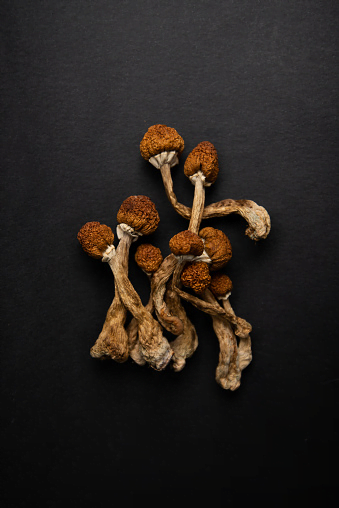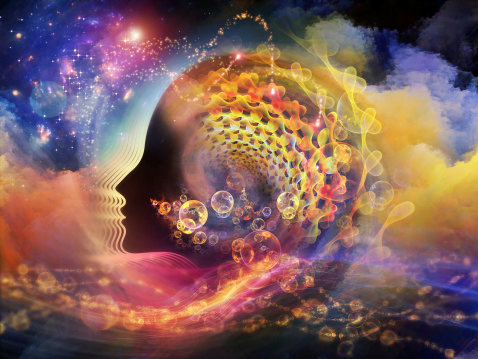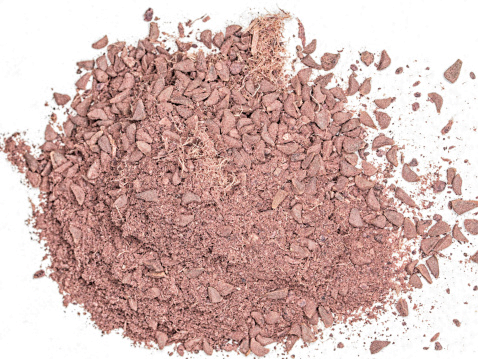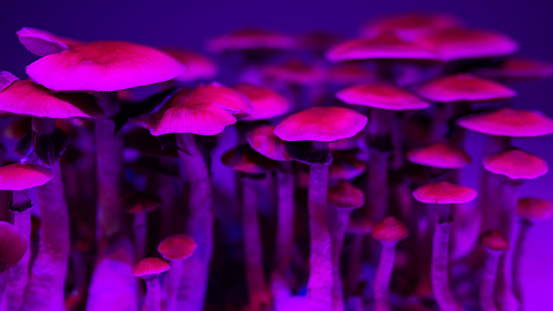Table of Contents
Psychedelic drugs or hallucinogens are a class of medications used to alter and improve sensory perceptions, cognitive processes, or energy levels. These drugs enable spiritual experiences. Chemicals like LSD and herbs like peyote are among them.
Hallucinogens are a class of medications that affect the perception of their environment and feelings. Classic and dissociative substances are the two most common types. Hallucinations, or feelings and visuals that appear real but aren’t, can be caused by different hallucinogens. Dissociative medications can also make people feel out of command or alienated from their bodies and surroundings.
There is no addiction. Because of the powerful reward feedback mechanism that drugs create, they will block the reuptake of learning-associated chemicals like dopamine, ultimately leading to dependence. Alternatively, like the natural 5-HT receptor serotonin, the hallucinogen mushroom works as an activator of the receptors such as 5-HT2A and 5-HT2C. Unlike dopamine, serotonin is associated with long-term happiness and memory rather than short-term pleasure, which is thought to prevent addiction.
1. The Brain and Body Effects of DMT
Psychedelic results are felt within moments of taking the substance. Both mental and physiological impacts are included. People can have “great” experiences, in which they have pleasant feelings, or “poor” trips, in which they have unpleasant emotions. You must be thinking about where to get DMT in Toronto.
When taken orally rather than smoking or sniffing, DMT usually has no psychedelic effects. Medication is rendered inactive by the biochemical enzyme monoamine oxidase.
When consumed directly in combination with other substances that stop it from being digested, it does generate psychedelic effects.
2. Psilocybin, also known as magic mushrooms, soothes rather than enhances certain brain activities.
The prevailing belief is that psychedelics generate their effects by doing something extra—increasing activity, adding hallucinations, promoting consciousness, etc. Psilocybin lowers activity in particular areas of the brain, according to a study that looked at brain scans of persons who were under its influence. The drug’s effect on learning and memory is due to this decrease in inactivity. Psychedelics, particularly psilocybin, may remove what is known as “noise.”
The prefrontal cortex assists us in processing thoughts, setting and achieving objectives, directing our attention, dealing with ambiguity, managing emotional reactions, processing information, predicting repercussions, and making long-term plans. People fail to focus, process data, and pay attention to particular activities when hallucinogens interact with this area of the brain. Individuals using hallucinogens may view a blank wall as shifting and whirling or filled with insects instead of being able to set their sights on it. Individuals are caught in a delusional state of mind until the substance’s consequences wear off, as their cognition levels fall.
3. May disrupt serotonin-based neural brain networks.
Neural circuits are groupings of neurons that operate together to perform specific functions. When hallucinogens disrupt serotonin-based brain circuits, they disrupt regular activities depending on the chemical signal. An individual’s attitude, food, and sleep needs may all vary. Their body temperature may swing wildly, and they may struggle to manage their muscle movements.
Read more about online therapy and find out if prescription medication might be right for you.
4. May cause spiritual experience.
Experts are not sure why psychedelics cause such intense spiritual experiences. British researchers employed brain imaging tools to compare how the brain appears on psychedelics with placebo in the latest report. They discovered significant differences between psychedelic drugs and the placebo, with LSD-induced brain pictures revealing substantially more connectivity across different parts of the mind.
It may describe visual hallucinations, as it indicates that during an LSD trip, multiple areas of the brain — not simply the visual cortex of the mind — are interacting.
According to the researchers, it could explain why psychedelic substances cause hallucinatory experiences and how they can help people. Psychedelics may break down such diseases by destroying the activity patterns on which they are based, which is comparable to their ‘entropic’ influence on cortical activity. One of the few studies to date has looked into how the mechanical and physical impacts of psychedelic drugs on the brain may benefit patients.
Other research isn’t clear on the specific mechanisms, but it shows that traditional psychedelics influence serotonin and dopamine receptors that can help individuals feel better.
5. Small sample size of the research
Because the research is still in its early stages and has limited sample sizes, it’s challenging to establish whether psychedelic medications are beneficial.
Even said, as promising as the study appears, it is still in its early stages. The biggest problem with the research is that they have tiny sample sizes, with most having fewer than 60 individuals. Other methodological difficulties include that some studies do not evaluate a drug’s effectiveness with placebo or have a robust control group.
In the Johns Hopkins experiment, 80 percent of subjects did not smoke for six months after receiving psilocybin treatment, which is an incredible accomplishment. However, just 15 people took part. There was no controlled study or placebo, so it’s unknown whether the psilocybin or another component — such as the psychotherapy that went along with the psilocybin — was responsible for the outcomes.
These small sample sizes are a flaw in previous research. Small trials can be misleading: they can overstate a treatment’s advantages or even suggest benefits that aren’t present. As psychedelic research expands to larger sample sizes, the positive effects of these drugs may become less apparent — or maybe disappear entirely.
There are also a slew of other issues that scholars would like to investigate: What effect will different doses of various psychedelic drugs have on different conditions? What is the duration of the advantages? Are there any other mental health diseases that can benefit from psychedelic-assisted therapy, such as eating disorders? For those who aren’t religious, have some of the advantages decreased or eliminated?
One of the most pressing concerns is how long the benefits of psychedelic-assisted psychotherapy will remain. However, psychedelic use may someday assist more people than only the terminally ill.
6. Studies are for terminally ill
However, there’s no reason to suppose the benefits are only available to that group. After all, practically everyone has some form of death-related fear. Psychedelics may be able to aid with such anxiousness.
People who experienced psilocybin-induced experiences showed increased flexibility in personality assessments, according to a 2011 study by Johns Hopkins experts. Individuals in psilocybin treatments reported better life happiness and beneficial impacts on happiness, particularly among those who claimed the most intense spiritual experiences, according to other Johns Hopkins research published in 2008 and 2011. Researchers stress that these are preliminary findings and do not recommend unsupervised individual use.
They do, however, indicate that many individuals, even those without a severe, documented ailment or condition, may benefit from psychedelic-assisted treatment.
However, because psychedelic treatments can last months or years, the research is costly and time-consuming and necessitates a significant amount of time and training. As a result, these small private institutions have only been able to support small-scale studies thus far, resulting in limited sample numbers and less rigorous methods.
7. Is it true that hallucinogens are psychoactive?
Yes, in some situations. Some hallucinogens may be addictive, and people may build sensitivity to them. Since it does not create uncontrollable drug-seeking conduct, LSD is not an addictive drug. However, because LSD causes tolerance, some people who take it frequently will need to consume large dosages to achieve the same result. Given the volatility of the medication, this is a dangerous practice. LSD also causes resistance to other hallucinogens, like psilocybin.
DMT’s potential for abuse and addiction is still unknown. DMT does not seem to cause tolerance, unlike some other hallucinogens.
No proof shows consuming it as ayahuasca tea may contribute to addiction. PCP is a substance that has the potential to be addictive. Drug cravings, migraines, and sweating are frequent withdrawal symptoms for those who stop using PCP regularly.
More research into the tolerance and addiction possibilities of various hallucinogens is necessary. Many people utilize psychedelic drugs to make an event or concert more enjoyable. Psychedelic substances may reduce anxiety, depression, and PTSD in the lab in several previous studies.
The researchers of several studies wanted to see if these substances can replicate similar improvements in mood and psychological health in the real world.
According to other research, psychedelics may provide different psychological benefits to some people. Some supporters have pushed microdosing — taking fewer doses of psychedelic substances daily that are too low to generate a high — as a solution for sadness and anxiety. The microdosing study is still active. Other research into how psychedelics influence the brain and whether you may use them to aid persons suffering from these conditions continues.
With a small amount of evidence, psilocybin clearly distinguishes itself from existing medications. Antidepressants may take weeks to act, while psilocybin works quickly. Furthermore, the consequences of a single psilocybin dosage appear to persist for weeks or even months.
Conclusion
Many hallucinogens are obtained from plants and mushrooms, while others are created synthetically. Hallucinogens have been utilized for religious and healing rites in the past. People have recently reported using these substances for social and recreational reasons, such as to have fun, relieve stress, face mystical experiences, or think differently. Psychedelics change an individual’s thoughts, perception of control, and emotions by influencing all of their senses. They can also produce hallucination, when a person sees or hears things that do not occur or are confusing.




